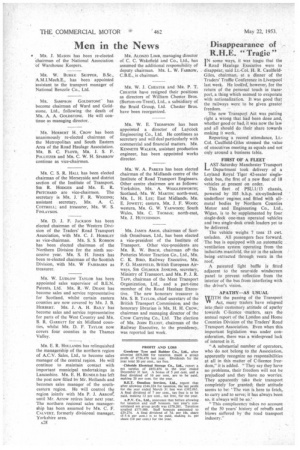Disappearance of R.H.E. " Tragic "
Page 30

If you've noticed an error in this article please click here to report it so we can fix it.
IN some ways, it was tragic that the J. Road Haulage Executive were to disappear, said Lt.-Col. H. R. CaulfieldGiles, chairman, at a dinner of the Traders' Traffic Conference in Liverpool last week. He looked, however, for the return of the personal touch in transport, a thing which seemed to evaporate with nationalization. It was good that the railways were to be given greater freedom.
The new Transport Act was putting right a wrong that had been done and, whether good or bad, it was now the law and all should do their share towards making it work.
Reporting a record attendance, Lt.Col. Caulfield-Giles stressed the value of executives meeting as equals and not only around a business table.
FIRST OF A FLEET
LAST-Saturday Manchester Transport Department took delivery of a Leyland Royal Tiger 42-seater singledeck bus, the first of a new fleet of 18 vehicles at present on order.
This fleet of PSU.1/13 chassis, powered by 105 b.h.p. six-cylindered underfloor engines and fitted with allmetal bodies by Northern Counties Motor and Engineering Co., Ltd., Wigan, is to be supplemented by four single-deck one-man operated vehicles and two single-deck crush loaders yet to be delivered.
The vehicle weighs 7 tons 13 cwt. unladen. All passengers face forward. The bus is equipped with an automatic ventilation system operating from the induction manifold, the air in the saloon being extracted through vents in the roof.
A patented light baffle is fitted adjacent to the near-side windscreen panel to prevent reflection from the interior of the bus from interfering with the driver's vision.
APATHY—AS USUAL
VVITH the passing of the Transport Act, many traders have relapsed into their customary attitude of apathy towards C-licence 'matters, says the annual report of the London and Home Counties Division of the Traders' Road Transport Association. Even when this important legislation was under consideration, there was a widespread lack of interest in it.
"A substantial number of operators, who do not belong to the Association, apparently recognize no responsibilities at all in this matter of C-licence freedom," it is added. "They say they have no problems, their freedom will not be prejudiced and they have no worries. They apparently take their transport completely for granted; their attitude seems to be: 'The van is here to fetch, to carry and to serve; it has always been so, it always will be so.'
"This complacency takes no account of the 50 years' history of rebuffs and blows suffered by the road transport industry."




















































































